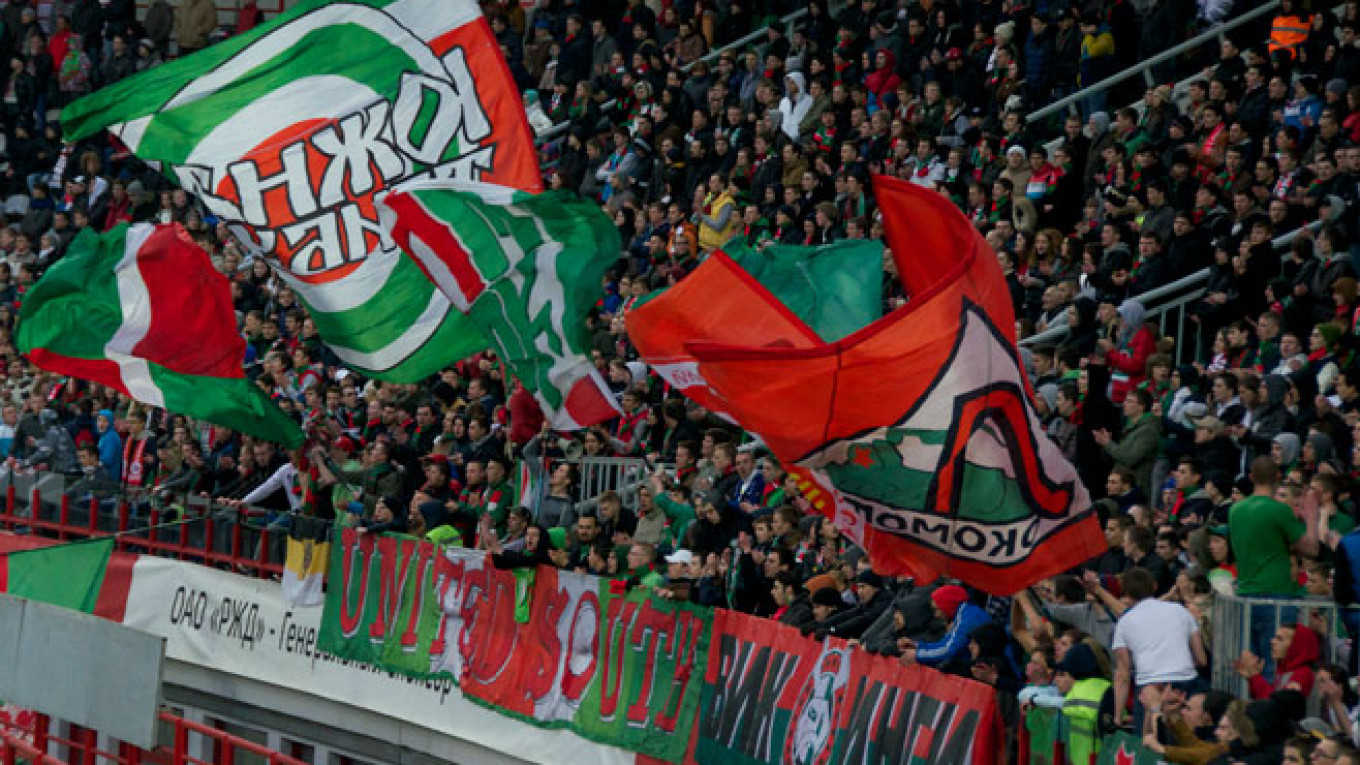The Zenit Ultra fan accused of striking Moscow Dynamo defender Vladimir Granat has been identified as Alexander Nesterov, a 45-year-old St. Petersburg resident who denied that he hit the Moscow player.
Merely the latest in a long string of instances of fan-related violence in Russian football, the recent violence at the Zenit-Dynamo game reinforced uncertainties about how stadiums will manage security during the upcoming 2018 FIFA World Cup, which will be held in 11 cities across Russia.
The Zenit St. Petersburg soccer team has been given a two game stadium ban by the Russian Football Union after fans stormed the field during a game with rivals Dynamo Moscow, one of them attacking Granat and striking him in the back of the head. Granat remained in St. Petersburg for medical care.
Dynamo was leading the match 4-2 in the 87th minute of the game when hardcore Zenit Ultra fans from the club's cheering section stormed the field. In the wake of the attack, the Russian Football Union fined Zenit 1 million rubles ($28,800) and decreed that Zenit would play the first two games of next season in a closed stadium with no fans, adding that the cheering sections where the club's hardcore fans sit would be closed for an additional three games.
Despite promises to increase security, Zenit fans have a reputation for rowdiness, and this in not the first time that they have run amok. In 2012, another Zenit-Dynamo game was disrupted when a Zenit fan threw a flare onto the field, injuring Dynamo goalie Anton Shunin.
Earlier this season, Zenit Ultra fans created controversy for burning a Chechen flag during a game against Terek Grozny, the Chechen football team. Several fans were arrested for hooliganism, and Zenit was fined 300,000 rubles for the inappropriate actions of its fans, a sum which it later managed to recoup from the guilty parties.
However, despite the bad reputation of the Zenit Ultras, the team is by no means alone in having rowdy fans — Russian football as a whole has been plagued by incidents of violence and racism involving football fans, a problem that the Russian Premier League and law enforcement have sought to combat with increased security and alcohol bans.
The sale of beer was banned in stadiums as early as 2005, and attending a football game generally involves several lines of metal detectors, pat-downs and bag searches. In 2012, President Vladimir Putin suggested that the beer ban be lifted prior to the 2018 World Cup, but the recent fan violence suggests that more restrictions rather than less may be necessary.
As multi-ethnic, international groups of fans prepare to come to Russia for the World Cup, it remains unclear what will happen when they are seated side by side with Russian football hooligans on their home turf.
Russian soccer teams certainly do not have the best record when playing internationally: In February, leading Russian football team CSKA was ordered to play a Champions League game in a partially closed stadium after UEFA punished the team for its fans' racist behavior for the second time this season, and Russian fans routinely lead racist chants against black players at home and abroad.
In October, 40 fans of Moscow's Spartak football club were arrested after displaying a flag with a swastika and brawling with police. Indeed, virtually all of Russia's best football teams from major cities like Moscow and St. Petersburg have seen instances of fan violence from rival soccer hooligans.
While football fans have been known for their violent clashes in many European countries, Russia seems to be doing a comparatively poor job keeping the problem in check compared to countries like England, which traditionally suffered from football hooliganism but has developed a better reputation after major crackdowns in the 1990s.
Much of the violence in Russia stems from dedicated fan clubs, organizations like the Zenit Ultras that attend all of a team's games and sit in an area of the stands called a "Virazh," or cheering section. In many instances, these fan clubs are at odds with the teams they support due to the massive fines they incur, yet so far no clubs have taken steps to distance themselves from these groups.
Russia's FIFA 2018 organizational committee has so far offered no special plans on how they will keep hooligans in check, and with most of the venues still under construction it is difficult for law enforcement to anticipate their requirements.
Representatives of FIFA and European football associations have already expressed reservations about possible violence in Russia: When Russia first won the bid for the World Cup in 2010, Rafal Pankowski of the FARE (Football
Against Racism in Europe) East Europe Monitoring Centre accused the Russian Football Union of purposely downplaying the problem of racism and fan violence.
"Nazi slogans are common in many Russian stadiums — matches are often interrupted with racist chants aimed at black players," Pankowski said, The Guardian reported. "There is hardly any acknowledgement of racism either inside or outside the grounds by the government and football authorities in Russia, and there is a pattern of denial when the problem is raised."
Numerous prominent African football players have reported verbal abuse from Russian football fans. In 2013, Manchester City midfielder Yaya Toure said black players might boycott the 2018 World Cup if issues of racism were not dealt with after complaining of racist slurs shouted by fans of Moscow's CSKA football club.
The 2018 World Cup is still four years away, yet unless the Russian Football Union treats incidents like that in St. Petersburg more seriously, foreign fans may be in for an unpleasant surprise in Russian stadiums.
Contact the author at g.golubock@imedia.ru


